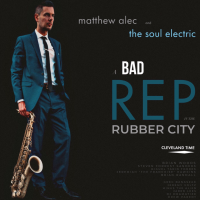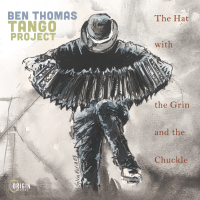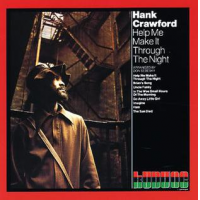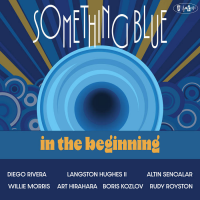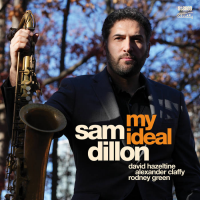Home » Jazz Articles » Liner Notes » Melvin Rhyne: Classmasters
Melvin Rhyne: Classmasters

Jimmy Smith
organ, Hammond B31925 - 2005
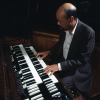
Melvin Rhyne
organ, Hammond B31936 - 2013

Wes Montgomery
guitar1923 - 1968
Lucky to be part of a healthy renaissance movement involving the classic sound of the B-3 and the type of funky fare that was prosperous and bountiful over three decades ago, Rhyne is currently taking advantage of the cyclical nature of fads and stylistic "ins" and "outs." Since the early '90s, this Indianapolis resident has made the most of a renewed interest in his particular brand of jazz organ. Added now to five previous Criss Cross dates as a leader, two as a co-leader with The Tenor Triangle and several sideman appearances for the label, Classmasters is Rhyne's latest offering and it serves as a tribute, in a way, to the young musicians on the date who continue to inspire him. "These guys are masters," says Rhyne, "and to me it's like going to heaven to get to work with them."
Over the course of his many Criss Cross dates, beginning with 1992's The Legend (Criss Cross 1059), Rhyne has developed quite a simpatico relationship with guitarist

Peter Bernstein
guitarb.1967

Kenny Washington
drumsb.1958

Grant Green
guitar1935 - 1979

Larry Goldings
organ, Hammond B3b.1968
Drummer Kenny Washington, in addition to being an astute jazz historian and radio dee-jay, is simply one of the best drummers of his generation, with a distinguishing sound and confident swing that can lift even the most pedestrian session out of monotony. He too has become a first-call musician and his appearances on a plethora of contemporary releases are simply too numerous to even count. Taken as a threesome, Rhyne, Bernstein, and Washington can seemingly do no wrong.
Filling out the ranks, we hear once again from tenor saxophonist

Eric Alexander
saxophone, tenorb.1968

Charles Earland
organ, Hammond B31941 - 1999

Dexter Gordon
saxophone, tenor1923 - 1990

Tim Warfield
saxophone, tenor
Chris Potter
saxophone, tenorb.1971
On to the music, the blues, of course, can never be too far away when you're working in this type of format. The opening "Stanley's Shuffle" provides the fodder for a laid-back bump and grind that seems to find everyone in a good mood. Melvin spins chorus after chorus, turning on the vibrato mid-stream. "Kenny Washington loves to play those shuffles like that and we do a shuffle on every CD you know, but I think we kind of outdid ourselves this time," enthuses Rhyne with a disposition akin to that of a proud father.
Escaping any of the banal sentimentality of previous covers, "What Are You Doing the Rest of Your Life" springs from the gates with a bracing lilt that's positively infectious, the opening vamp based on the old standard "Delilah." Alexander tells a concise and well-crafted story, ending with a robust flourish that leads nicely into Rhyne's spot. As he does elsewhere, the organist plays with such taste and panache that it's easy to take him for granted at first. However, further listening will reveal a great sense of logic in his melodic development. After a short bit from Bernstein, Mel vamps it for all it's worth backed nicely by Eric's repeating riff.
Also from the pen of Michel Legrand, "Watch What Happens" brings with it an affiliation with Wes Montgomery. "I've always liked it because it lays so well, " Mel explains. "You don't have to do anything with it, just let it flow." And indeed the organ carries the tune quite simply at the onset, Rhyne's later improvisation marked by an ingenious quote from "Take the 'A' Train."
"Rhyne, Rhythm, and Song" was assembled from snippets of melodic ideas Rhyne had been collecting over the years and it proves to be as catchy as its humorous title seems to imply. "People are probably going to rib me about that title but I don't care. I had to come up with something quick." A cross between a funky boogaloo and a Latin groove, things settle in with Sadownick's congas and cowbell accents meshing beautifully with Washington's pseudo bossa beat. Alexander is up first, making the most of his big-toned attack and melodic approach. Mel takes a turn before Bernstein's spot, which is marked by some choice octaves a la Wes.
Bernstein's guitar attractively delivers the melody of "Don't Explain" in a fashion that seems to almost suggest a hushed whisper. A rediscovery of singer

Billie Holiday
vocals1915 - 1959

Thelonious Monk
piano1917 - 1982
With a discerning nod towards the work of

McCoy Tyner
piano1938 - 2020

Prince Lasha
flute1929 - 2008

Sonny Simmons
saxophone, alto1933 - 2021
With a hint of some spicy Latin accents, we get a new twist on Coltrane's "Like Sonny." Sadownick and Washington set things up on top of Rhyne's pulsating bass line, with Alexander then announcing the head. Avoiding the usual practice of every player taking on a number of choruses, each soloist (Bernstein, Rhyne, and Alexander, in that order) goes through the 24-bar chorus once before passing it off to the next man. This happens then a second time before Alexander returns to the theme which then concludes the performance. The connections between each solo statement make for a fascinating listen on this short and sweet little gem.
The concluding "What Is This Thing Called Love" finds everyone taking a stab at the kind of be-bop changes that Rhyne counts as his musical bread and butter, including Washington's only solo moments of the session. Nicely framed at the front end and the conclusion by a tom-tom fanfare that announces the arrival of the "Injuns," this up-tempo cooker successfully wraps up a collection of hand-picked tunes, some of them familiar and some not, but all of them putting on a fresh face thanks to the efforts of Rhyne and company.
Always the self-effacing one quick to deflect the attention towards the youngsters on hand, Melvin Rhyne is a "classmaster" in his own right who continues to champion the use of the organ as a valid instrument for the exploration of the jazz language, to say nothing of the example he sets regarding the benefits of cross-generational fellowship.
Liner Notes copyright ? 2025 C. Andrew Hovan.
Classmasters can be purchased here.
Contact C. Andrew Hovan at All About Jazz.
An avid audiophile and music collector, Chris Hovan is a Cleveland-based writer / photographer / musician.
Track Listing
Rhyne, Rhythm And Song; Watch What Happens; What Are You Doing The Rest Of Your Life; Stanley's Shuffle; Don't Explain; Well You Needn't; Oriental Flower; Search For Peace; Like Sonny; What Is This Thing Called Love.
Personnel
Melvin Rhyne
organ, Hammond B3Eric Alexander
saxophone, tenorPeter Bernstein
guitarKenny Washington
drumsAlbum information
Title: Classmasters | Year Released: 2000 | Record Label: Criss Cross
Tags
Comments
PREVIOUS / NEXT
Support All About Jazz
 All About Jazz has been a pillar of jazz since 1995, championing it as an art form and, more importantly, supporting the musicians who make it. Our enduring commitment has made "AAJ" one of the most culturally important websites of its kind, read by hundreds of thousands of fans, musicians and industry figures every month.
All About Jazz has been a pillar of jazz since 1995, championing it as an art form and, more importantly, supporting the musicians who make it. Our enduring commitment has made "AAJ" one of the most culturally important websites of its kind, read by hundreds of thousands of fans, musicians and industry figures every month.
Go Ad Free!
To maintain our platform while developing new means to foster jazz discovery and connectivity, we need your help. You can become a sustaining member for as little as $20 and in return, we'll immediately hide those pesky ads plus provide access to future articles for a full year. This winning combination vastly improves your AAJ experience and allow us to vigorously build on the pioneering work we first started in 1995. So enjoy an ad-free AAJ experience and help us remain a positive beacon for jazz by making a donation today.

New York City
Concert Guide | Venue Guide | Local Businesses
| More...






 Buy Now
Buy Now




